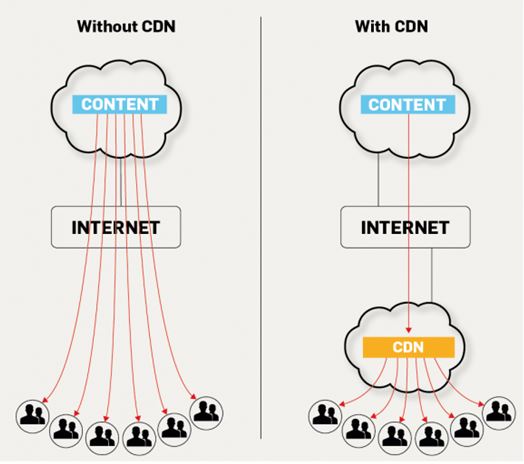What is Content Delivery Network? How CDN works?

What is Content Delivery Network?
A content delivery network (CDN) is a system of distributed servers (network) that deliver pages and other Web content to a user, based on the geographic locations of the user, the origin of the webpage and the content delivery server. … CDNs also provide protection from large surges in traffic.
In similar words Content Delivery Network (CDN) is a globally distributed network of web servers whose purpose is to provide faster delivery, and highly available content. The content is replicated throughout the CDN so it exists in many places all at once. Other than better performance, CDNs also offload the traffic served directly from the content provider’s origin infrastructure, resulting in possible cost savings for the content provider. Content delivery networks (CDN) are the transparent backbone of the Internet in charge of content delivery. Whether we know it or not, every one of us interacts with CDNs on a daily basis; when reading articles on news sites, shopping online, watching YouTube videos or perusing social media feeds.
To put it more simply, the purpose of a CDN is to improve user experience and provide it with more efficient network resource utilization. Content providers such as media companies and e-commerce vendors pay CDN operators to deliver their content to their audience, that is, end-users. In turn, a CDN pays ISPs, carriers and network operators for hosting servers in their data centers.
Users with high-speed connections often experience choppiness, loading lags and poor quality, especially when viewing live events or if they are located far from the hosting servers. CDNs minimize latency issues that cause image jitters, optimize delivery speeds and maximize available bandwidth for each viewer.
How CDN Works?
Content Delivery Networks (CDN’s) are an important part of Internet infrastructure that are frequently used without a full understanding of what’s happening behind the scenes. So how it actually works is explained below.
As CDN minimizes the distance between the visitors and your website’s server, so to do it a CDN stores a cached version of its content in multiple geographical locations (a.k.a., points of presence or PoPs). Each of these Points of Presence (PoPs) or data centers that are situated around the world contains a number of caching servers responsible for content delivery to visitors within its proximity. Servers nearest to the website visitor respond to the request. The content delivery network copies the pages of a website to a network of servers that are dispersed at geographically different locations, caching the contents of the page. When a user requests a webpage that is part of a content delivery network, the CDN will redirect the request from the originating site’s server to a server in the CDN that is closest to the user and deliver the cached content. So both the PoPs and servers help accelerate the speed at which content is delivered to the end user.
This is how a CDN works in a nutshell.
CDN Reseller
According to a report, CDN market to grow to USD 23.22 Billion by 2021. This is because companies finally understand the fact that growing role of the “cloud” in business and consumer applications, from web apps to ecommerce platforms has created a new set of expectations amongst users. Most people now expect applications to be fast on all devices, anywhere, and at any time. With a CDN in place you can ensure that this is the case. To direct this realization of speed’s impact on conversions, companies are on the hunt for solutions. And to find these solutions, they’re contacting experts they trust.
Taking into account this scenario, CDN reselling is a method that allows one to add CDN to the ranges of services it offers, minus the hassle of actually building and maintaining one’s own Content Delivery Network. CDN reseller companies give you the opportunity to offer your customers the gift of speed on your terms. If you’re an ISP, Hosting Provider or a Web Development agency, you’ll know that the demand for accelerated content has never been higher.
CDN Reselling has number of Benefits that includes:
- Innovative features for your customers
- It provides one with easy and increased income
- CDN Resellers helps you manage multiple CDN accounts with one platform
- Some CDN Resellers even provide POPs that give you access to a growing worldwide network of servers, meaning you can service customers all over the world
So, with all the information provided to you about CDN, how it works and CDN reselling services and how its market has a growth rate in next five years, there has never been a better time to take advantage and become a CDN Reseller.

Live Comment
Your email address will not be published.